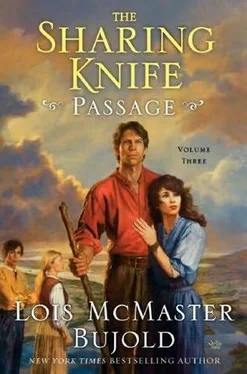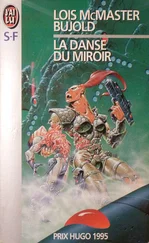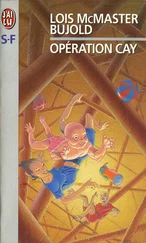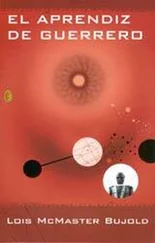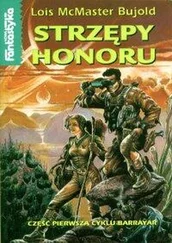“And if you make one more of your stupid hook-jokes,” Fawn added levelly, “I swear I’ll clout you on the ear.”
“Um. Right.”
Dag started unloading saddlebags, thinking, We need some rain. Soon.
They all settled in quicker than Fawn would have guessed. Berry’s uncle Bo accepted Dag’s presence without comment, though her little brother Hawthorn, who was rising twelve but not yet come to his growth spurt, gaped round-eyed and mute, and tended to skitter away when Dag loomed too close. But Fawn and Berry joined forces on cooking dinner, Berry mainly showing Fawn where and how things aboard were cleverly kept, and after eating it Bo and Hawthorn both smiled at Fawn a lot.
Thinking she had better start as she meant to go on, Fawn made sure the washing-up fell mainly to Whit and Hawthorn. As the night chilled and the river mist rose, everyone gathered around the remains of the cook fire in the little hearth, augmented by the light of a rock-oil lantern, and were encouraged to drink up as much of the foaming cider as they could hold.
Whit wandered to peer out the back hatch, then came and settled himself again on his stool with a sigh. “Think it’ll rain soon?” he asked. Of the air generally, as near as Fawn could tell, and with no expectation of a reply.
Bo held out one battered boot and wriggled it. “My weather toe says no rain tonight.”
Whit looked skeptical. “You have a toe that can tell the weather?”
“Yep. Ever since it got busted, that time.”
Berry grinned over the rim of her tankard. “Hey, don’t you go questioning Uncle Bo’s bad toe. It’s as good as a coin toss any day.”
“The weather in the Grace Valley can change sudden, this time o’ year,” Bo advised Whit amiably. “Rain, snow, wind—fog. Why, one time when I was workin’ a keel up from Silver Shoals, the fog came down so solid you couldn’t hardly see your hand in front of your face. It was so thick it held the boat back, it did, and finally the boss said to put down our poles, ’cause he was anchoring for the night. Next morning, we woke up to all this mooing, and found we’d run right up over that fog for a good half-mile onto shore, and the keel was stuck in some farmer’s cow-pasture.”
Whit sat up, snorting cider out his nose. He rubbed it on his sleeve, and said, “Go on, you did not!”
Hawthorn, looking equally skeptical, said, “So how’d they get the keelboat back in the river?”
“Rollers,” said Bo blandly.
Hawthorn’s lips twisted in doubt at this logical-sounding reply.
Bo’s head went back in mock-offense, those hairy gray eyebrows seeming to jig. “No, it’s as true as I speak! Twisters, now, those are good for a tale or two as well.”
“Twisters?” said Fawn uneasily. “You get twisters on the river?”
“Now and then,” said Berry.
“You ever been in one?” asked Whit.
Berry shook her head, but then Dag’s deep voice sounded for nearly the first time that evening. “I was, once, on the upper Gray.”
Everyone looked around as surprised as if one of the chairs had suddenly spoken. In the gloom almost beyond the fire circle, legs stretched out, Dag raised his tankard in return and drank. Only Fawn saw his indrawn breath, sensed that he was about to make an effort that did not come easily to him.
“There were six of us, paddling a big narrow boat full of furs down from Luthlia for the river trade. The storm came up sudden, and the sky turned dark green. We pulled in hard to the western bank and tied everything to the trees, which was not so reassuring when the trees started to rip out of the ground and tumble away like weeds. Strangest sight I ever saw, then—the wind had picked up a horse, this white horse, out of a pasture somewhere to the west, and it passed us by straight overhead, its legs churning away like it was galloping. Galloping across the sky.”
A little silence followed this; Bo’s gray eyebrows climbed. Then Hawthorn said, “So, what happened to the horse? Did you see it come down?”
“We were all too busy gripping the ground and being terrified, right about then,” said Dag. “The poor thing was killed, likely.”
Hawthorn’s face scrunched up in dismay; Dag glanced from it to Fawn, and swiftly offered, “Or it might have spun down and landed in a pond. Swum out, shook its dizzy head, and started eating grass.”
Hawthorn brightened slightly. So did Whit, Fawn noticed, and bit her lip.
“That was a tall tale, right?” said Whit, in a tone of some misgiving.
Dag let his eyes widen innocently. “Was it supposed to be?”
“Yes, that’s how the contest goes, in farmer,” Whit explained earnestly. “You’re supposed to top the tall tale with another tall tale.”
“Oh, sorry,” said Dag, ducking his head. “You’re not allowed to tell true tales, then? I can see I’m going to be at a disadvantage.”
“I…” Whit paused and looked confused. “Uh…”
Berry scrubbed her lips. Bo’s face was unreadable, but he did raise his tankard at Dag in a delicately conceding gesture.
Berry, after a glance comparing the length of Dag to the length of her bunks, offered a place for Fawn and Dag’s dual bedroll amongst the forward cargo. It was dank and dark and smelled of the stack of hides that cushioned their blankets, but Berry also donated a length of coarse cloth, which she and Fawn tacked up to the low beams and around for privacy. During this wordless concession to Fawn’s recently married state, Berry looked a trifle pensive, but she bade the pair good-night without comment.
So, it seemed the Dag-deprivation that Fawn had feared on this crowded leg of the journey was not to be. A stack of hides had no betraying rope nets to creak in time with any movement in the bodies so supported. Dag had only to muffle her giggles with a lot of kisses, which he seemed quite willing to do, as they undertook the pleasant task of finding each other in the pitchy shadows. She was reminded that his groundsense worked just the same in the dark as in the day. She missed the sight of him, bliss to her eyes, but a careless candle was like to set the curtains on fire anyhow, defeating the aim of all this smothered discretion.
After, lying up under his arm in her favorite position with her ear to his heart, she whispered, “Was that story about the flying horse really true?”
“Yep.” He added, “I’ll amend it next time. I can see I need to add in that pond.” His chest rumbled in an unvoiced laugh.
“Depends on your audience, I expect. Some boys’d likely want to hear all about how the critter burst when it hit the ground.”
“It probably did,” he said ruefully.
“I like Hawthorn,” Fawn decided upon reflection. “He seems kindhearted, for a boy. But not shy or scared with it.” Which said good things about Berry, who’d had the raising of him. “Children and animals, you can usually tell how they’ve been treated. I mean…think of poor Hod.”
“I’d rather not,” sighed Dag.
They curled tightly into each other, and even the unrhythmic blend of snores from the bunks aft, so few paces away, could not keep her awake in this cozy harbor.
Dag woke in a vastly better mood. He occupied the morning letting Hawthorn and Daisy show him and Copperhead to the patch of meadow just up Possum Run, where the boatmen grazed their animals. They had the place nearly to themselves. Dag spent a peaceful couple of hours stretched out under a tree dozing while Copperhead munched grass, which also allowed him to avoid Whit and his energetic scheme for the day of transferring his cargo, crate by crate, from the goods-shed to the Fetch. After failing to recruit Dag, Whit had tried to rope in Fawn, but she cannily claimed to be too busy with stocking the flatboat’s larder in support of her more lavish style of cooking, a task no one would let him impede.
Читать дальше
